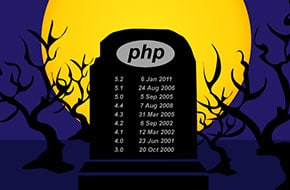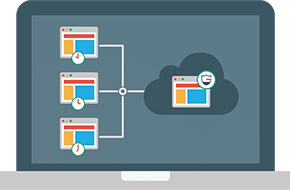
PHP Versions 5 and 7.0 Will No Longer Be Supported
Learn how to keep your website safe and up to date
PHP is the backbone of WordPress. It’s an integral coding language that’s part of not only the base WordPress functionality, but also countless plugins and custom themes too. Due to the ever-developing nature of the web and coding languages, PHP is updated fairly often, and the older versions are left behind. According to its website, each version is supported for three years total. On that same page, there’s also a chart showing that a PHP end of life has happened – all versions in 5 and version 7.0 are no longer being supported.
Does this PHP End of Life Affect Me?
First off, you’ll need to check what version of PHP your website is running on. If you have access to your server through FTP or otherwise, it’s pretty easy to check. Simply create a new text file called info.php and paste the following code snippet in there:
<?php phpinfo(); ?>
Then upload the info.php file into the root directory of your website. Once that’s done, navigate to the file name on your website, with a link such as this: www.yourdomain.com/info.php, where “yourdomain” is your actual domain. That page will have a detailed report of your PHP installation, with the version right up at the top. If you’re running version 7.1 or higher, you’re in good shape! If you’re running anything 7.0 or lower, then you’ll need to switch.
Don’t head off to the next step just yet – you’ll need to run some kind of compatibility check to ensure your website won’t break if you switch PHP versions. The ease of switching all depends on how up to date all of your code and plugins are. One easy way to do this is with the free PHP Compatibility Checker plugin.
Making your site fully compatible depends on the issues that come up. If it’s an old plugin, you may be out of look if it’s no longer supported. You can try manually changing the out of date code, but it may be worth considering a new plugin. The same goes for any customizable themes you may have purchased. However, if had a custom theme developed, or a custom plugin, then you can feel secure in updating the code manually to ensure compatibility. Need help with this? Mr. WPress would be glad to assist.
What Do I Do About the PHP End of Life?
Changing PHP versions depends on your hosting setup. If you host with an advanced third party such as WPEngine, Dreamhost, or others, then there’s likely a simple setting that you can change with a button or two. Each hosting platform is different, so if you’re not sure, you can check their knowledge base or reach out to their customer service to help you with the transition. The switch will be easy compared to the compatibility check.
If you self-host or host with a less advanced third party, you likely have a cPanel for your website. Each cPanel is a little different from the next, but you’ll be able to find a setting or line of code to update somewhere that dictates the PHP version of the site. Again, we encourage you to check your host’s documentation for assistance, just to ensure you get the smoothest switch possible.
All seem a bit over your head? Mr. WPress would be delighted to help you check your version, check your compatibility, transition your site, or all of the above. Contact us today to ensure your website is safe and up to date!



